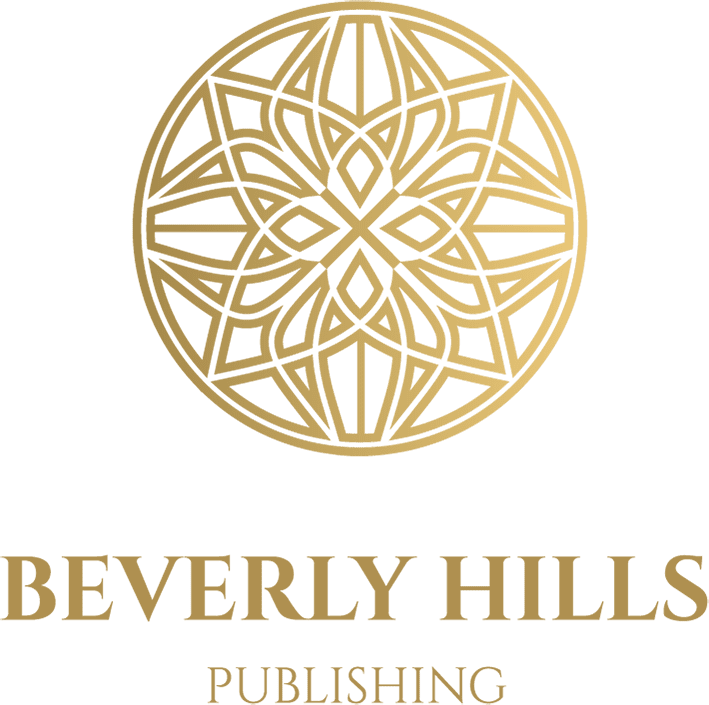At Beverly Hills Publishing, we understand the importance of a well-crafted author website. It’s the digital hub for your literary career, connecting you with readers and industry professionals alike.
In this post, we’ll explore author website best practices to help you create an engaging online presence. From essential elements to design tips and content strategies, we’ll cover everything you need to know to make your author website shine.
What Makes an Author Website Effective?
An effective author website serves as your digital storefront, showcasing your literary work and personal brand. Let’s explore the key elements that make an author website truly effective.
Craft a Compelling Author Bio
Your author bio often serves as the first impression for visitors. Make it count. Write a concise, engaging introduction that highlights your unique voice and experiences. An author biography briefly tells the reader everything they need to know about your credentials, writer journey, and previous works. Update your bio regularly to reflect your latest achievements and publications.
Showcase Your Literary Portfolio
Your published works should take center stage. Create a dedicated section that displays your books prominently. Include high-quality cover images, brief synopses, and links to purchase. If you have a series, consider grouping them together for easy navigation. Don’t forget to include any awards, notable reviews, or bestseller status to build credibility.
Design an Intuitive Book Catalog
Organize your books in a way that’s easy for visitors to browse. Consider categorizing by genre, series, or publication date. Implement a search function if you have an extensive catalog. Each book should have its own page with detailed information (including an excerpt, reviews, and purchasing options). This structure not only aids navigation but also improves your website’s search engine optimization.
Implement Strong Calls-to-Action
Every page should guide visitors towards a desired action, whether it’s purchasing a book, signing up for a newsletter, or booking you for an event. Place clear, compelling calls-to-action (CTAs) strategically throughout your site. For instance, add a “Buy Now” button next to each book, or a “Subscribe” form for your mailing list in the sidebar. Make these CTAs stand out visually and use action-oriented language to encourage clicks. Implement best practices for your CTA buttons to help you get a higher click-through rate and more conversions.
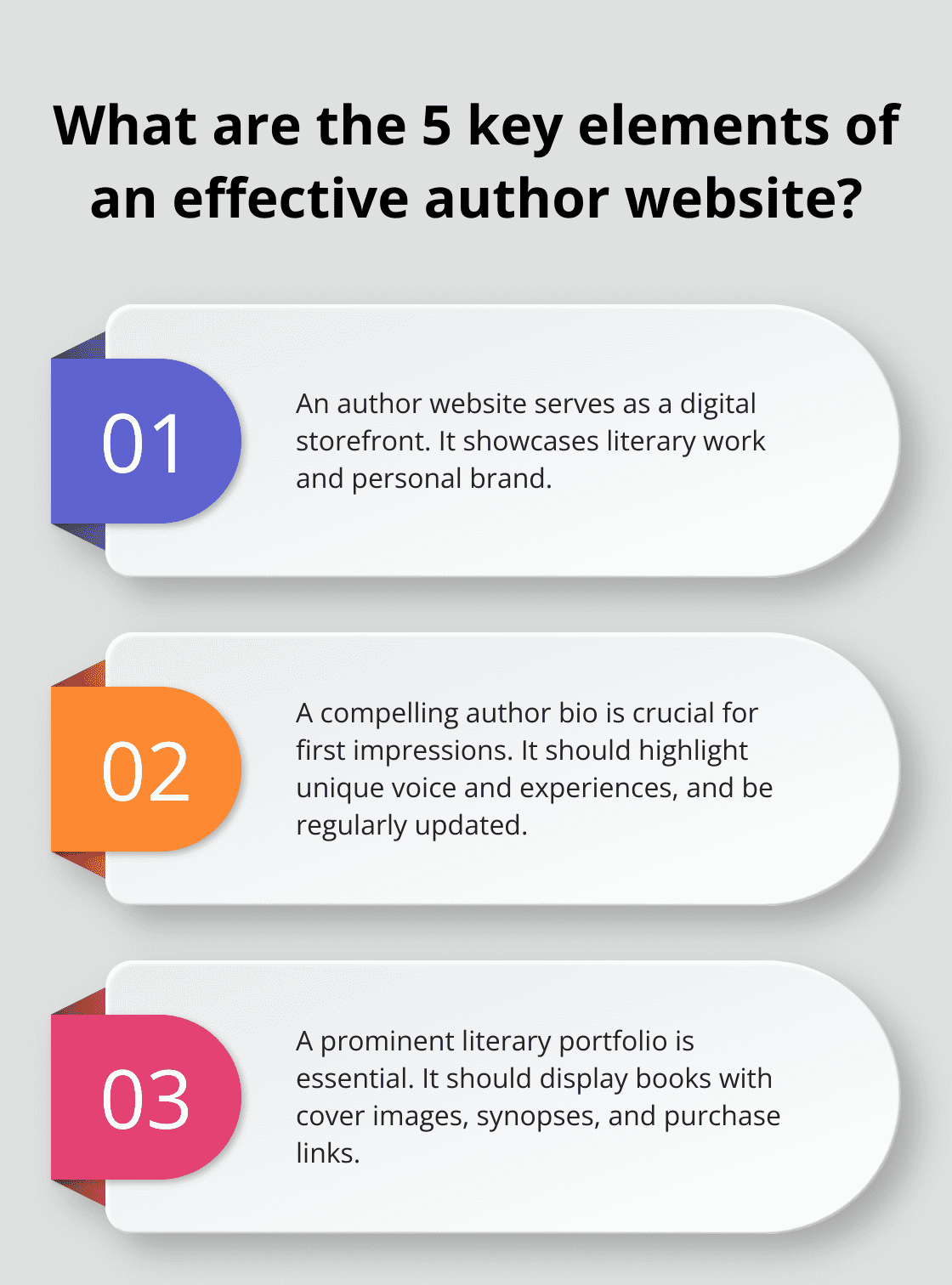
Your author website requires regular updates with new content, upcoming releases, and events to keep readers engaged and returning for more. These essential elements set the foundation for a powerful online presence that supports your writing career and connects you with your audience. Now, let’s move on to explore the best practices for design and user experience that will elevate your author website to new heights.
How to Create a User-Friendly Author Website
Optimize for Mobile Devices
Mobile devices account for 63.38% of global website traffic as of September 2024. Your author website must look great and function seamlessly on smartphones and tablets. Use a responsive design that adjusts to different screen sizes. Test your site on various devices to ensure readability and easy navigation. Pay attention to button sizes and spacing on mobile to prevent accidental clicks.
Create a Cohesive Visual Identity
Your website should reflect your author brand consistently. Choose a color palette and typography that align with your book covers and overall writing style. (For example, thriller writers might opt for darker colors and bold fonts.) Maintain this visual identity across all pages of your site. This consistency helps readers instantly recognize your brand, whether they’re on your website, social media, or looking at your book cover.
Prioritize Website Speed
A slow website can frustrate visitors and negatively impact your search engine rankings. Google reports that 53% of mobile site visitors leave a page that takes longer than three seconds to load. Optimize your images, minimize plugins, and consider using a content delivery network (CDN) to improve loading times. Regularly test your site speed using tools like Google PageSpeed Insights and make necessary adjustments.
Simplify Navigation
Make it easy for visitors to find what they’re looking for on your site. Implement a clear, intuitive menu structure with descriptive labels. Consider using a sticky header that remains visible as users scroll, allowing for easy navigation from any point on the page. Include a search function, especially if you have a large amount of content or multiple books. The goal is to help visitors quickly access your books, blog posts, and other important information without frustration.
Incorporate Engaging Visual Elements
Use high-quality images and graphics to enhance your website’s visual appeal. Include professional author photos, book cover images, and relevant illustrations that complement your writing style. (Visual elements can significantly improve user engagement and make your site more memorable.) However, balance is key – avoid cluttering your pages with too many images, which can slow down your site and distract from your content.
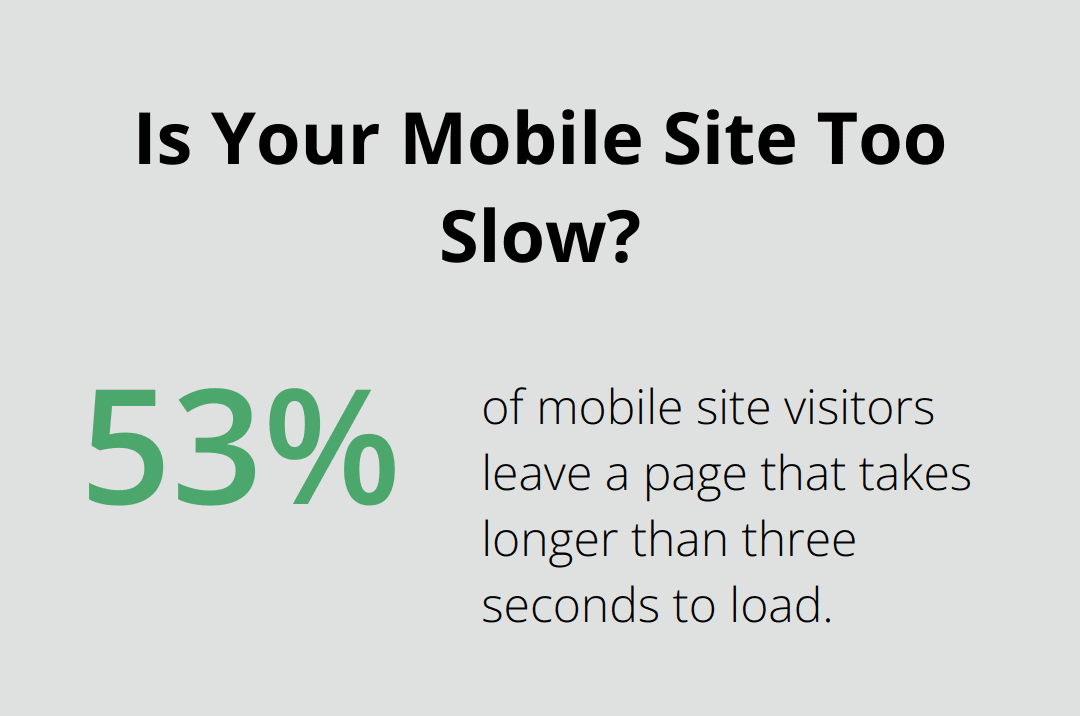
These design and user experience best practices will help you create an author website that not only looks professional but also effectively serves your readers and supports your writing career. Your website often serves as the first point of contact between you and potential readers, so it’s essential to make a strong impression. In the next section, we’ll explore content strategies that will keep your audience engaged and coming back for more.
How to Create Engaging Content for Your Author Website
Leverage the Power of Blogging
Regular blog posts connect you with your audience effectively. Try to publish one blog post per week. Topics can range from behind-the-scenes glimpses of your writing process to book recommendations or industry insights. (For example, mystery writers might share posts about their research process for a new novel or their favorite true crime podcasts.)
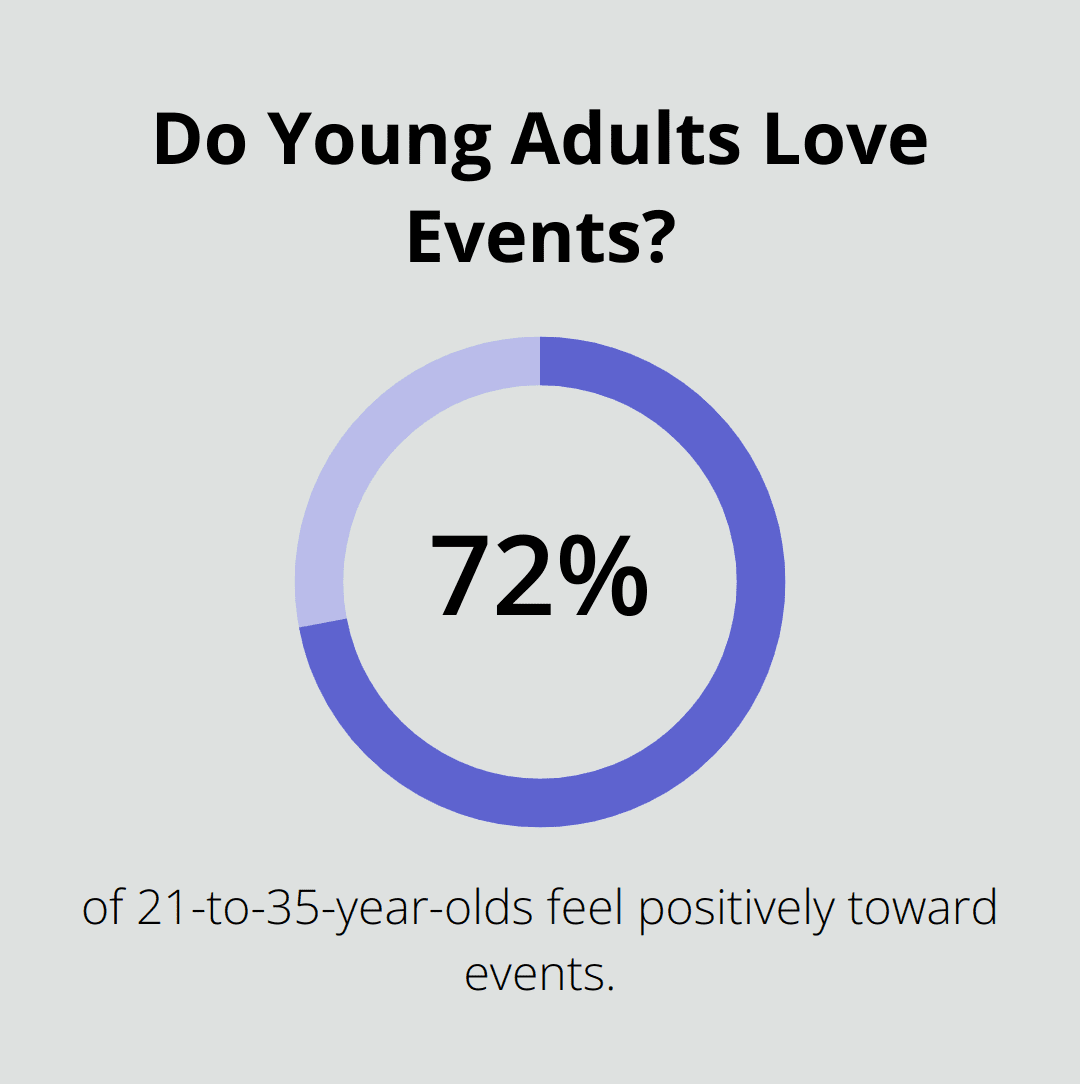
A study by HubSpot reveals that websites with blogs have 434% more indexed pages than those without. This increased content improves search engine rankings and drives more traffic to your site.
Implement Email Marketing Strategies
An email newsletter allows direct communication with your most engaged readers. Place a prominent sign-up form on your website. Offer an incentive like a free short story or exclusive content to encourage subscriptions.
Email marketing statistics from HubSpot demonstrate the powerful impact of this strategy, making it one of the most effective marketing tools available to authors.
Develop a Comprehensive Media Kit
A well-prepared media kit opens doors to publicity opportunities. Include a high-resolution author photo, book cover images, your bio, book synopses, and any notable reviews or awards. Make this easily accessible on your website for journalists, bloggers, or event organizers who might want to feature you.
Create an Informative Events Calendar
An up-to-date events calendar showcases your active presence in the literary world. Include book signings, speaking engagements, writing workshops, and virtual events. This informs your readers and demonstrates your expertise and engagement with your audience.
According to Eventbrite statistics, more than half of event attendees want to attend more events in 2024 compared to 2023, with 72% of 21-to-35-year-olds feeling positively toward events. By prominently featuring your upcoming appearances, you tap into this interest and potentially increase attendance at your events.
Maintain Consistency and Quality
The key to a successful content strategy lies in consistency and quality. Update your website regularly with fresh, valuable content that resonates with your target audience. This approach builds a loyal readership and establishes you as a respected voice in your genre.
Final Thoughts
An effective author website serves as a cornerstone for your literary career. It showcases your work, engages readers, and establishes your brand in the digital realm. Author website best practices include mobile optimization, intuitive design, and compelling content strategy. These elements work together to create a powerful online presence that supports your writing journey and connects you with a global audience.
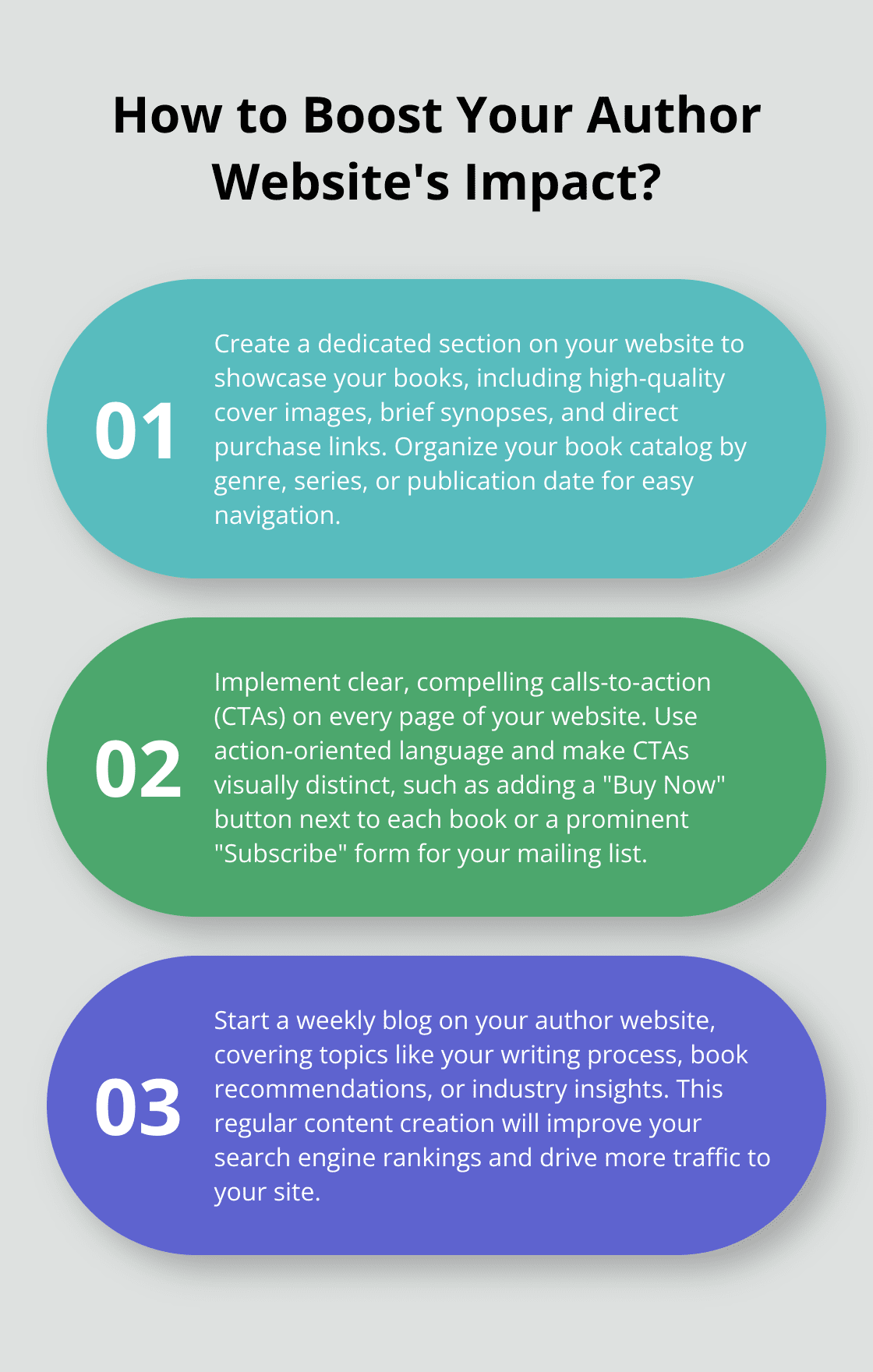
Regular updates and refinements keep your site relevant in the ever-evolving digital landscape. Your author website is a dynamic tool that requires ongoing attention to maintain its effectiveness. We at Beverly Hills Publishing recognize the impact of a well-crafted online presence in today’s publishing world. (Our innovative approach combines cutting-edge strategies with comprehensive branding and marketing solutions.)
Take action now to review or plan your author website with these guidelines in mind. Your online presence can significantly influence your success as an author. For expert guidance on author success strategies, explore our services at Beverly Hills Publishing and elevate your writing career to new heights.















































































































































































































































